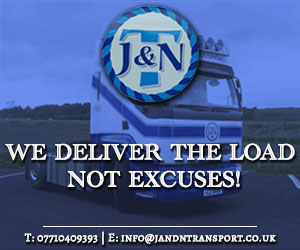15/07/2005
Report on food transport reveals effect on environment
The transport of food across the UK has a “significant and growing impact” on road congestion, accidents, climate change, noise and pollution, a new report has claimed.
According to the report by the Department for Environment, Food and Rural Affairs (Defra), the environmental and social costs of the transporting food is estimated at £9 billion per year with more than half due to road congestion.
Defra found that the quantity of food transported by heavy goods vehicles has doubled since 1974 and food transport now accounts for a quarter of all HGV vehicle kilometres in the UK.
Consumers are now also travelling an average of 898 miles per year by car to shop for food, the report found.
Defra’s breakdown of environmental, social and economic costs of food transport found that £5 billion was due to road congestion, £2 billion to road accidents, £1 billion to pollutions and £1 billion to other factors. The report suggested that food shopping by car accounted for 40% of the total costs.
The report also found that 19 million tonnes of carbon dioxide was produced by food transport in 2002, 10 million tonnes of which are emitted in the UK, representing 1.8% of the total annual UK Co2 emissions.
However, the report said that, although general higher levels of vehicle activity lead to higher environmental impacts, the mode, timing, location and efficiency of food transport is important as well as the distance.
Sustainable Food and Farming Minister Lord Bach said: “This study is an interesting contribution to the ‘food miles’ debate. It shows that the issue is complex and that a range of factors have an effect on the overall impacts of food transport, not purely the distance travelled by individual products.”
Lord Bach said that Internet buying and home delivery could help reduce vehicle kilometres and road congestion. He also suggested that purchasing local products could help reduce congestion and purchasing organic and seasonally available food could reduce environmental impacts, although both of these benefits could be offset if they were transported in an inefficient way.
The government is working with the food industry to combat the problem, through the draft Food Industry Sustainability Strategy, a plan for achieving a 20% reduction in the environmental and social costs of food transport by about 2012.
(KMcA/GB)
According to the report by the Department for Environment, Food and Rural Affairs (Defra), the environmental and social costs of the transporting food is estimated at £9 billion per year with more than half due to road congestion.
Defra found that the quantity of food transported by heavy goods vehicles has doubled since 1974 and food transport now accounts for a quarter of all HGV vehicle kilometres in the UK.
Consumers are now also travelling an average of 898 miles per year by car to shop for food, the report found.
Defra’s breakdown of environmental, social and economic costs of food transport found that £5 billion was due to road congestion, £2 billion to road accidents, £1 billion to pollutions and £1 billion to other factors. The report suggested that food shopping by car accounted for 40% of the total costs.
The report also found that 19 million tonnes of carbon dioxide was produced by food transport in 2002, 10 million tonnes of which are emitted in the UK, representing 1.8% of the total annual UK Co2 emissions.
However, the report said that, although general higher levels of vehicle activity lead to higher environmental impacts, the mode, timing, location and efficiency of food transport is important as well as the distance.
Sustainable Food and Farming Minister Lord Bach said: “This study is an interesting contribution to the ‘food miles’ debate. It shows that the issue is complex and that a range of factors have an effect on the overall impacts of food transport, not purely the distance travelled by individual products.”
Lord Bach said that Internet buying and home delivery could help reduce vehicle kilometres and road congestion. He also suggested that purchasing local products could help reduce congestion and purchasing organic and seasonally available food could reduce environmental impacts, although both of these benefits could be offset if they were transported in an inefficient way.
The government is working with the food industry to combat the problem, through the draft Food Industry Sustainability Strategy, a plan for achieving a 20% reduction in the environmental and social costs of food transport by about 2012.
(KMcA/GB)
Related UK National News Stories
Click here for the latest headlines.
28 March 2008
School's Out For Junk Food
The School Food Trust is to set in motion measures that will curb school children binging on junk food. Currently in some parts of England, pupils have a choice of more than 40 fast food shops, with many targeting children with special lunch menus.
School's Out For Junk Food
The School Food Trust is to set in motion measures that will curb school children binging on junk food. Currently in some parts of England, pupils have a choice of more than 40 fast food shops, with many targeting children with special lunch menus.
06 October 2008
New Council of Food Policy Advisors Announced
The establishment of a new team of advisers on food policy from 'the farm to the fork' has been announced today by Hilary Benn, Secretary of State for the Environment, Food, and Rural Affairs.
New Council of Food Policy Advisors Announced
The establishment of a new team of advisers on food policy from 'the farm to the fork' has been announced today by Hilary Benn, Secretary of State for the Environment, Food, and Rural Affairs.
18 April 2008
Calls For Tougher Junk Food Advertising Laws
More than eighty percent of adults believe junk food advertising can make it difficult to feed children healthy food, a new survey has claimed. Consumer watchdog Which? Found 83% of consumers surveyed wanted the government to become more involved in controlling the marketing of unhealthy food to children. In total 2,000 people were questioned.
Calls For Tougher Junk Food Advertising Laws
More than eighty percent of adults believe junk food advertising can make it difficult to feed children healthy food, a new survey has claimed. Consumer watchdog Which? Found 83% of consumers surveyed wanted the government to become more involved in controlling the marketing of unhealthy food to children. In total 2,000 people were questioned.
25 October 2004
Tourists warned of risks of bringing food into the UK
The risks and controls prohibiting people bringing food into the UK from EU countries have been highlighted today as part of a public awareness campaign launched today. The current rules mean that it is illegal to bring meat and milk-based products for personal use back into the UK from outside the EU.
Tourists warned of risks of bringing food into the UK
The risks and controls prohibiting people bringing food into the UK from EU countries have been highlighted today as part of a public awareness campaign launched today. The current rules mean that it is illegal to bring meat and milk-based products for personal use back into the UK from outside the EU.
29 October 2003
New proposals set to curb fast-food littering
Fast-food outlets and customers will be encouraged to clean up their act under voluntary proposals published today by the government.
New proposals set to curb fast-food littering
Fast-food outlets and customers will be encouraged to clean up their act under voluntary proposals published today by the government.
-
Northern Ireland WeatherToday:There will be a mix of sunny spells and a few, mainly light, showers during the morning, mostly in the west. Cloudier with scattered showers into the afternoon. Maximum temperature 11 °C.Tonight:Scattered showers and clear spells continue through this evening, becoming dry with clear skies for a time overnight. Clouding over by morning. Minimum temperature 2 °C.








